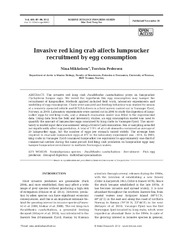Blar i forfatter "Mikkelsen, Nina"
-
Community structure of deep fjord and shelf benthic fauna receiving different detrital kelp inputs in northern Norway
Ramirez-Llodra, Eva; Pedersen, Torstein; Filbee-Dexter, Karen; Hauquier, Freija; Guilini, Katja; Mikkelsen, Nina; Borgersen, Gunhild; van Gyseghem, Margo; Vanreusel, Ann; Vilas, Daniel (Journal article; Tidsskriftartikkel; Peer reviewed, 2020-11-05)Kelp forests produce large amounts of macroalgal detritus, ranging from whole plants to small particles (1 mm). The role of this kelp detritus in fueling deep-sea communities adjacent to healthy kelp forests was investigated in a region in the north of Norway by comparing the community structure and biodiversity of meio-, macro-, and megafauna in two deep (450 m) areas with different expected input ... -
Invasive red king crab affects lumpsucker recruitment by egg consumption
Mikkelsen, Nina; Pedersen, Torstein (Journal article; Tidsskriftartikkel; Peer reviewed, 2012)The invasive red king crab Paralithodes camtschaticus preys on lumpsucker Cyclopterus lumpus eggs. We tested the hypothesis this egg consumption may hamper the recruitment of lumpsucker. Methods applied included field work, laboratory experiments and modelling of egg consumption. Crabs were sampled and feeding behaviour was studied by means of a remotely operated vehicle and SCUBA divers in a field ... -
Overexploitation, Recovery, and Warming of the Barents Sea Ecosystem During 1950–2013
Pedersen, Torstein; Mikkelsen, Nina; Lindstrøm, Ulf; Renaud, Paul Eric; Nascimento, Marcela C.; Blanchet, Marie-Anne; Ellingsen, Ingrid H.; Jørgensen, Lis L.; Blanchet, Hugues (Journal article; Tidsskriftartikkel; Peer reviewed, 2021-09-17)The Barents Sea (BS) is a high-latitude shelf ecosystem with important fisheries, high and historically variable harvesting pressure, and ongoing high variability in climatic conditions. To quantify carbon flow pathways and assess if changes in harvesting intensity and climate variability have affected the BS ecosystem, we modeled the ecosystem for the period 1950–2013 using a highly trophically ... -
Predation on early life stages is decisive for year-class strength in the Barents Sea capelin (Mallotus villosus) stock
Gjøsæter, Harald; Hallfredsson, Elvar H.; Mikkelsen, Nina; Bogstad, Bjarte; Pedersen, Torstein (Journal article; Tidsskriftartikkel; Peer reviewed, 2015-10-11)Year-class strength of Barents Sea capelin has been monitored closely since the early 1970s and during this ∼45 years period three short periods of almost total recruitment failure leading to three stock collapses have been observed. These events triggered much attention since there was a large commercial fishery for capelin, but also because of observed ecosystem effects attributed to the first of ... -
Predation on the demersal fish eggs of capelin Mallotus villosus and lumpsucker Cyclopterus lumpus in relation to recruitment
Mikkelsen, Nina (Doctoral thesis; Doktorgradsavhandling, 2013-10-09)Mortality of demersal fish eggs caused by predation was investigated in this research project. The selected prey species were the Barents Sea capelin Mallotus villosus and lumpsucker Cyclopterus lumpus L, while the selected predators were capelin itself by cannibalistic behaviour and the invasive red king crab Paralithodes camtschaticus. Both capelin and lumpsucker are commercially important species ...


 English
English norsk
norsk



